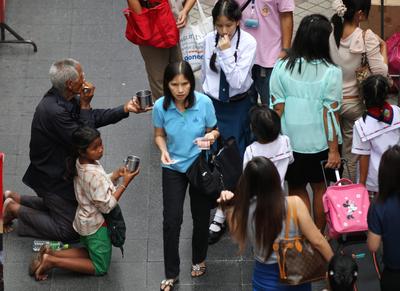The current Abhisit government was accused of coming to power illegitimately when the courts dissolved the ruling pro-Thaksin party and the military helped piece together Abhisit’s coalition. Despite the political turmoil in Bangkok in May 2010 that ended with 89 civilian deaths, Abhisit’s royalist and military backups remain strong and the Red Shirt movement this year has been subdued. Unemployment has not been a problem and the sentiment in the stock market is still bullish. The government’s survival is thus principally dependent on its economic management competency, handling the cost of living.
Thailand’s rebound from the world financial crisis was quite strong, helping to legitimise the government’s historic borrowing scheme of Bt1.49 trillion (US$49 billion) to boost the economy and undergo massive populist campaigns. The government is lucky in that Thailand is a food producer and major exporter. The strength of the Baht has also helped reduce pressures from import costs.
But, thus far, the Abhisit administration has not succeeded in tackling the problem, and the crisis has damaged the Abhisit cabinet’s image — not only for its mismanagement and lack of preventive mechanisms in price control but also for being involved with graft. One of the most of obvious examples of this was the sight of people standing in long queues to buy just one bottle of cooking palm oil — totally astonishing given Thailand is the world’s third-largest producer of palm oil. The government was seen as incompetent for its delayed decision to import palm oil to alleviate the situation, and the opposition played a hard ball in spreading accusations that collusion among government politicians and businessmen created the ‘artificial’ shortage.
In dealing with essential commodities such as diesel, LPG and NGV, the government has applied a policy of ‘capping the price with government subsidies’. For the time being, this has seen diesel price frozen at Bt30 per litre, LPG at Bt18.13 per kilogram and NGV at Bt8.50 per litre. While intended to court votes for the upcoming general election, particularly from the pro-Thaksin rural sector, it will soon result in the depletion of oil fund, and excise tax cuts for diesel have been launched to decelerate the depletion. Yet, it is expected to reduce state revenue by about Bt45 billion this year, and whoever wins the election will inevitably be forced to either increase fuel price or create further debt from energy price subsidies. Furthermore, price rise spirals also cover many other consumer goods, and the government’s response (price subsidies and price controls) lack efficacy. (Some measures introduced were widely criticised as ridiculous, such as pricing eggs by weight.)
While the government is busy introducing an extraordinary budget bill that will add to extra government spending early this year, the central bank has been raising interest rates every time the monetary policy committee has met since late last year. The government has also provided extra budget for extraordinary salary increases for civil servants to cope with the higher cost of living. The contradictory directions of fiscal and monetary policy added further confusion to economic policy watchers, placing further pressure on monetary policy.
Instead of fixing prices unrealistically, or distorting them with huge subsidies, the government should allow prices to move more naturally with a more liberal import regime. This should be accompanied by stronger authorities ensuring fair market competition and no price collusion among producers or traders. Essential goods should be closely monitored and their markets be made more transparent. Stringent measures should be systematically executed to smoothen and ensure adequate supply in the local market. Otherwise, if out of control, price spiralling could be aggravated, adversely affecting not only the anti-government grassroots poor but also the neutral and pro-Abhisit middle class. The government might eventually lose its support and legitimacy, something that could be painfully reflected in the general election.
Dr Pisit Leeahtam is Dean of the Faculty of Economics at Chiang Mai University, Head of the Macroeconomics and Finance Working Group of the Thai National Economic and Social Advisory Council and the former Thai Deputy Minister of Finance. Cynn Treesraptanagul is a research assistant.


Despite the political problems. Thailand is still a very strong economy and I dont doubt its ability to continue to do well.